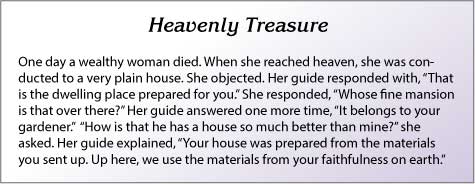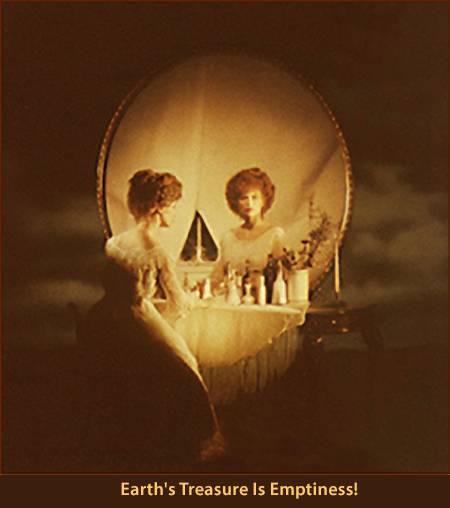May I start by asking, “What is your treasure?” I am not asking about something that might happen. I am not asking about an Irishman’s pot of gold at the end of a lucky rainbow. I am asking about the treasure you already have. Recently a pastor announced that he was driving a very expensive car, a Rolls Royce, and declared that he owned the pink slip. He paused and then said, “If you have a problem with that, I just want you to know that I am the one who is following Jesus.” Another pastor explaining that Jesus wants us to be rich said that Jesus wore “designer clothes.” His proof was John 19:2. He missed the fact the purple robe did not belong to Jesus! Treasure! What is your treasure? Automobiles? Clothes? A spouse? Your children? Your possessions? Treasure is Jesus’ next topic.
Do not lay up for yourselves treasures upon earth, where moth and rust destroy, and where thieves break in and steal. But lay up for yourselves treasures in heaven. . . Matthew 6:19-24 (NASB)
Treasure Up Treasure
During the time Jesus walked this earth, it was not uncommon for people to bury their treasure in their fields (Matthew 13:44) or in their homes. Some would invest their money in property, clothes, metals or jewels. These possessions, so carefully acquired, could easily be destroyed. And that is Jesus’ point. Our English Bibles record Jesus as saying, “moth and rust” destroy our treasure but the actual Greek says, “moth and eating away.” Jesus is talking about anything that destroys our treasure – insects, rot, and rust.”
Banks did not exist in Jesus day. So treasure was sometimes hid in one’s home. Since homes were usually made of mud, Jesus adds “and thieves dig through and steal.” He was referring to thieves who would dig through the wall of a home in search of treasure.
I have had my home robbed twice. I felt vulnerable even though my birth certificate was the only treasure stolen. What a funny word – treasure. It rusts, it can be eaten by insects. It can be stolen. People fight over it. How can such things be treasure?

Emptiness
Have you ever asked yourself, “Why do I work so hard?” What would cause you great pain if it was taken from you? What is your life all about? Ecclesiastes reminds us what the world really offers us,
Empty of empties,” says the Preacher, “Empty of empties! All is empty. Ecclesiastes 1:2 (NASB)
That is our life on this earth according to the wisest man, Solomon, that has ever lived. Life is a big fat zero! Life is meaningless and emptiness. Listen to his next statement,
What advantage does man have in all his work Which he does under the sun? Ecclesiastes 1:3 (NASB)
The word he uses for “work” has the idea of exhausting work and so his question is, “What is the benefit of working so hard on this earth?” Especially when,
A generation goes and a generation comes, But the earth remains forever. Ecclesiastes 1:4 (NASB)
His point is there is no benefit, since you just die in the end! We are born and we die, but the earth is still here after we die. We come and we go! That is it! And he is right!
Also, the sun rises and the sun sets; And hastening to its place it rises there again. Ecclesiastes 1:5 (NASB)
The sun comes and it goes, but it returns to do it all over again – but not us!
Blowing toward the south, Then turning toward the north, The wind continues swirling along; And on its circular courses the wind returns. All the rivers flow into the sea, Yet the sea is not full. To the place where the rivers flow, There they flow again. Ecclesiastes 1:6-7 (NASB)
This is true about everything else on this earth. Everything continues except for us. We come and we are gone!
All things are wearisome; Man is not able to tell it. The eye is not satisfied with seeing, Nor is the ear filled with hearing. Ecclesiastes 1:8 (NASB)
We work very hard to acquire things that make us happy only for awhile, and then we need something more.

Bad Eye Sight
That is Jesus’ next point.
. . . for where your treasure is, there will your heart be also. The lamp of the body is the eye; if therefore your eye is clear, your whole body will be full of light. But if your eye is bad, your whole body will be full of darkness. If therefore the light that is in you is darkness, how great is the darkness! Matthew 6:21-23 (NASB)
The term “bad eye” is a Jewish idiom that means the eye is always wanting something. We think we see clearly, but our eye can be “full of darkness”- full of wanting.
Conclusion
Emptiness is the world’s treasure. And we cannot tell it. And so we find ourselves serving our possessions. We can find ourselves pursuing emptiness – serving emptiness. So, Jesus reminds us that there are only two choices (Matthew 6:24). We can serve our treasure of emptiness, or we can serve God!
Some day each of us will stand before Him and our work will be evaluated,
Now if any man builds upon the foundation with gold, silver, precious stones, wood, hay, straw, each man’s work will become evident. 1 Corinthians 3:12 (NASB)
And we will either receive a reward for our good works, or our haystack of work will be burned up. Are you working on a big haystack? Just remember that stacks of gold are usually very small. Ephesians 2:10 tells us that Christians were born again to do good works. There are many examples in the Bible of good works that we can do, but I believe the real difference between hay and gold is revealed in this verse.
. . . the Lord comes who will both bring to light the things hidden in the darkness and disclose the motives of men’s hearts; and then each man’s praise will come to him from God. 1 Corinthians 4:5 (NASB)
Jesus wants the reason for your work to be the treasure of pleasing Him – nothing else.